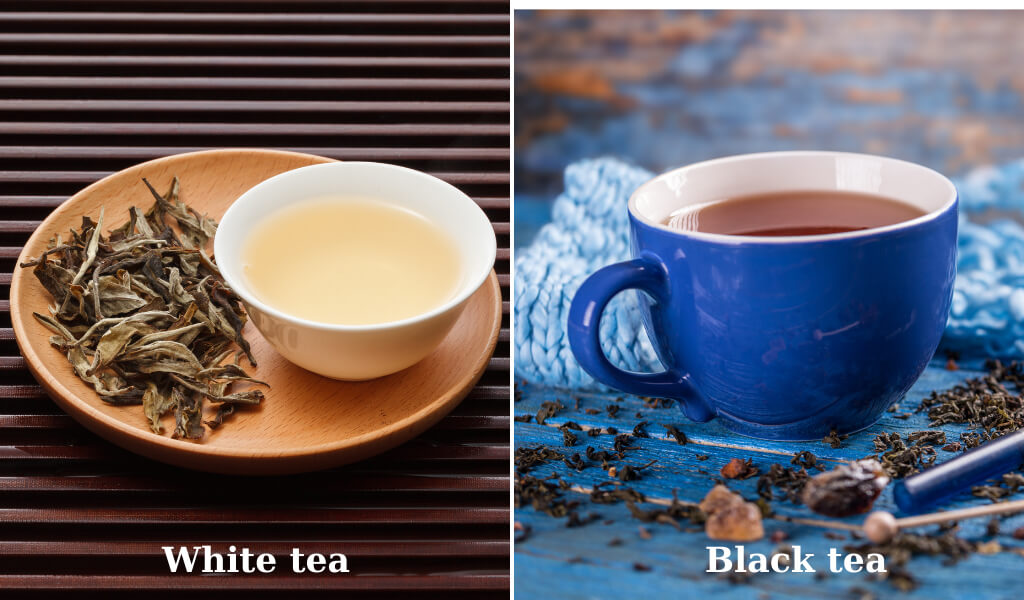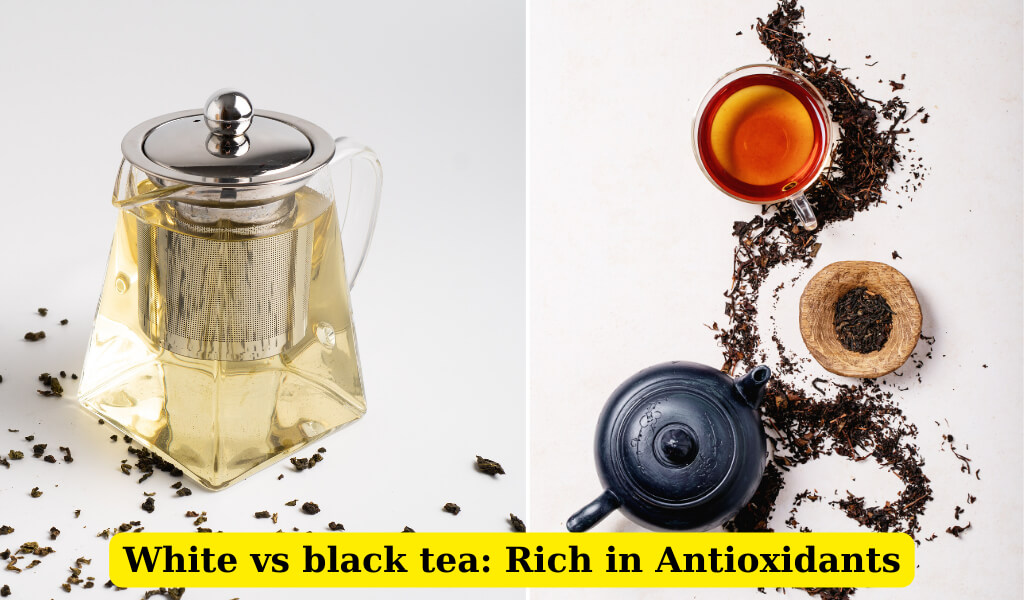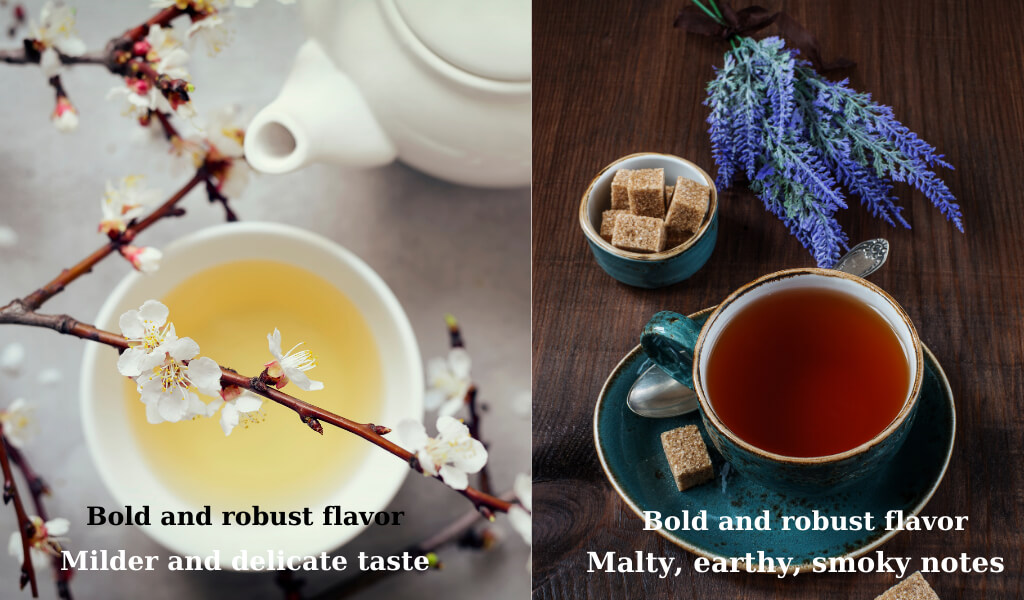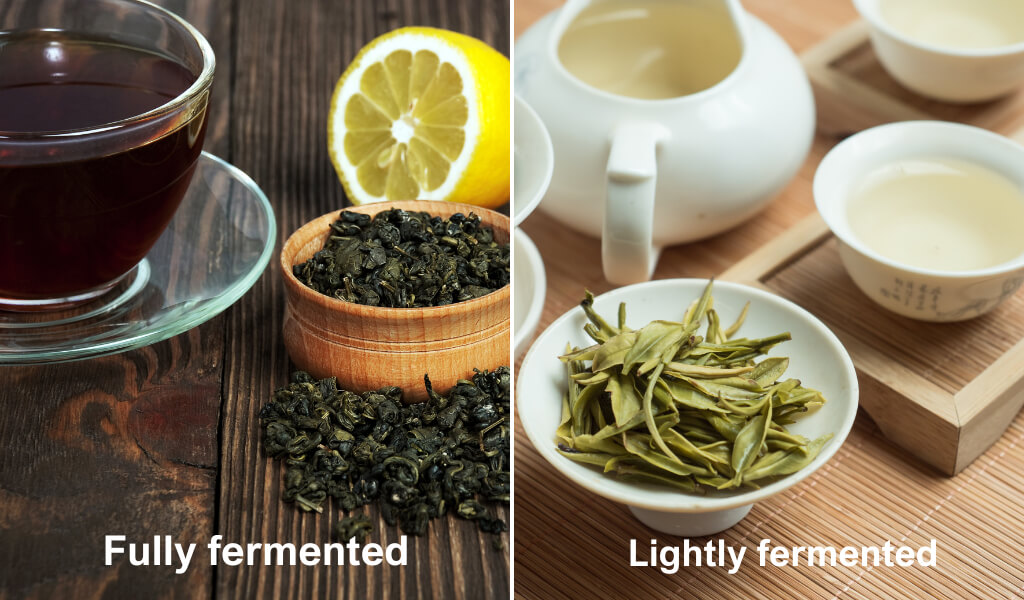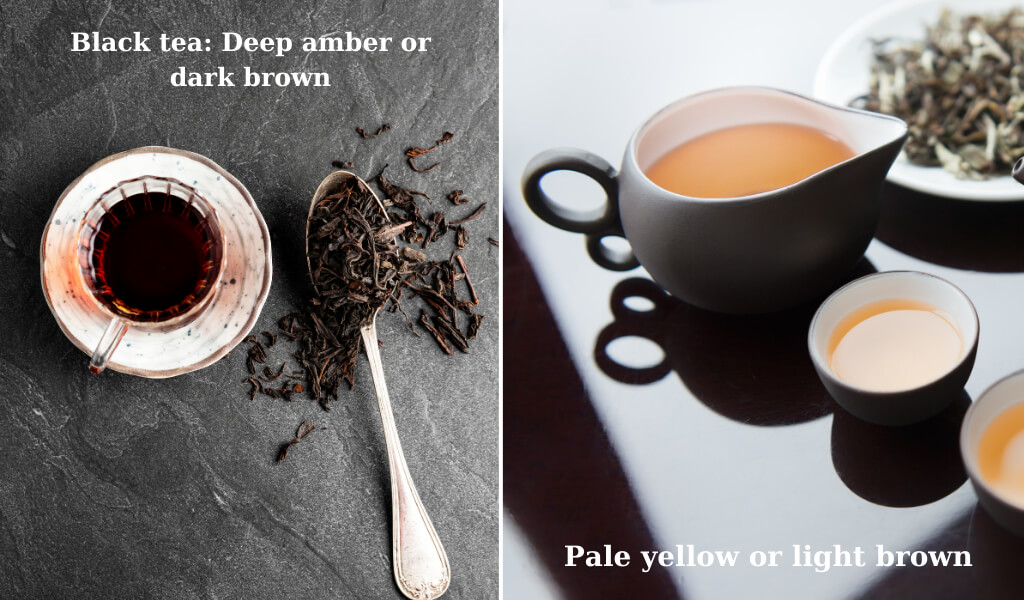I love comparing Black tea vs White tea, two of the most popular types of tea in the world. As a tea enthusiast, it’s always fascinating to delve into the unique characteristics of these beverages. There’s so much to explore and appreciate, from their diverse origins and manufacturing processes to their distinct flavor profiles.
Read More:
- Oolong vs Black Tea Comparison: Super interesting revelations
- Black Tea vs Green Tea: Some tips from tea Connoisseurs
- Black Tea vs Pu Erh tea: Flavors, Nutrition, And Benefits
Over the next few paragraphs, I invite you to join me through black and White tea. Together, we’ll uncover the nuanced differences and help you discover your new favorite brew.
Black tea vs White tea: the basics
White Tea
Let’s start with White tea. It’s often described as the lightest and most delicate variety and it has a fascinating origin story. The name White tea comes from the fine silvery-white hairs on the unopened buds of the tea plant, which give it a whitish appearance.
This tea originally hails from the Fujian province of China, but it’s now grown in various other parts of the world.
Historically, White tea was a luxury product reserved for royalty due to its rarity and the careful craftsmanship required to produce it.
Black Tea
Now, let’s turn our attention to Black tea.
This tea is the most popular in the world and has a long history entwined with major trading routes.
Black tea gets its name from the oxidized leaves’ dark color, which is a crucial step in its manufacture.
Although Black tea comes from China, India and Sri Lanka are where key kinds like Assam, Darjeeling, and Ceylon are cultivated, and these countries are probably where you’ve heard the term “Black tea” used most often.
This hearty tea has been a mainstay in many civilizations for many years, and it is still a cherished component of daily routines all around the world.
Here’s a quick comparison chart between Black Tea vs White Tea:
| Black Tea | White Tea | |
|
Nutrition
|
The non-sweetened, low-calorie drink | Minimal macronutrients (fat and protein) |
| Rich in powerful polyphenols | Abundant in antioxidants | |
| Contains carbohydrates (16.15%) | Retains higher antioxidant concentration | |
| Provides essential minerals | ||
|
Taste
|
Bold and robust flavor | Milder and delicate taste |
| Malty, earthy, smoky notes |
Light, ethereal quality with subtle floral or sweet undertones
|
|
| Fermentation Process | Fully fermented | Lightly fermented |
| Color | Deep amber or dark brown | Pale yellow or light brown |
| Cost | Generally more affordable | Often more expensive |
| Caffeine Content | Tends to have more caffeine | Lower caffeine content |
| Picking Seasons | Harvested throughout the year | Harvested in early spring |
Now that we have explored the basics of white and black tea, let’s delve into the intriguing similarities these two teas share.
Similarities Between Black and White Tea
Let’s explore these similarities and uncover the common ground between these wonderful teas.
Black tea vs white tea health benefits
Black teas are beneficial for the heart because they reduce arterial plaque and stimulate the brain. White teas, on the other hand, provide a number of benefits, including having more antioxidants than Black teas. White teas also include a wealth of amino acids, which help to soothe the body.
According to traditional Chinese medicine, White tea, with its calm nature, is known to help reduce fever and inflammation. On the other hand, Black tea is recognized for aiding in gastrointestinal digestion, promoting appetite, helping with diuresis, alleviating edema, and even strengthening heart function.
White vs Black tea: Rich in Antioxidants
Green tea and oolong tea are both loaded with antioxidants that have a number of health advantages. Antioxidants aid in the body’s fight against free radicals, which lowers the risk of chronic illnesses and enhances general health. You may take advantage of the benefits of these potent antioxidants whether you pick oolong or green tea.
Black tea vs White tea weight loss
They both contain natural compounds that have been linked to weight management. Oolong and green tea can help boost metabolism, increase fat oxidation, and even reduce body weight. Incorporating teas into a balanced diet and active lifestyle may support your weight loss or maintenance goals.
White Tea vs Black Tea: Which One Is Healthier?
White tea is harvested early, resulting in a low caffeine content of 10 mg. It possesses a delicate, sweet, and light flavor. In contrast, Black teas contain 60 mg of caffeine and offer a robust and flavorful experience. They are generally stronger and may have a more astringent taste.
White and Black tea both have their own benefits, so which one to choose depends on your tastes and your health objectives.
Now that the commonalities between white and Black tea have been established, it’s time to explore the distinctions between the two.
Difference between White and Black Tea
Black tea vs White tea nutrition
Black Tea:
- Non-sweetened and low-calorie drink
- Rich in powerful polyphenols, including epigallocatechin gallate, theaflavins, thearubigins, and catechins/flavonoids
- Contains carbohydrates (16.15%)
- Provides essential minerals: calcium (2.60%), copper (2.11%), phosphorus (1.43%), and potassium (1.38%)
White Tea:
- Minimal macronutrients (fat and protein)
- Abundant in antioxidants, such as polyphenols, flavonoids, and tannins
- Retains higher antioxidant concentration due to minimal processing
In conclusion, Black tea and White tea offer different nutritional profiles. Black tea provides carbohydrates, essential minerals, powerful polyphenols and other beneficial compounds. On the other hand, White tea may lack macronutrients but compensates with a higher concentration of antioxidants. Both teas have unique strengths, allowing individuals to choose based on their preferences and nutritional needs.
Black tea vs White tea taste
White tea, harvested at an early stage, contains a mere 10 mg of caffeine and boasts a delicate, sweet taste with a lighter flavor profile. Conversely, Black teas contain 60 mg of caffeine, offering a more robust and flavorful experience. They tend to be bolder, stronger, and may have a slightly astringent quality.
Black Tea Taste
Black tea might be the perfect choice if you enjoy a hearty, robust cup of tea with a touch of bitterness and depth.
Black tea is known for its bold and robust flavor. It often boasts malty, earthy, or even smoky notes depending on the variety. The taste can range from full-bodied and rich to slightly astringent.
Some Black teas exhibit hints of fruits, spices, or floral undertones, adding complexity to their flavor profile.
White Tea Taste
If you like a softer, gentler cup of tea with a bit of sweetness, white tea could be your best option.
White tea, on the other hand, has a delicate, mild flavor that is completely different from Black tea. With airy, almost ethereal undertones that are either flowery or sweet, it has a pleasant feel. The flavor characteristic of White tea can be characterized as crisp, reviving, and occasionally mildly grassy. White tea has less oxidation than other teas because of this, therefore it tastes more pure and delicate.
Fermentation Process
White tea undergoes a delicate fermentation process. The basic steps include withering, baking (or sometimes drying in the shade), sorting, and refiring. Black tea is a fully fermented tea, requiring a slightly more complex process. It involves withering, rolling, fermenting, and drying the tea tree shoots and leaves.
Color
White tea brews to a pale yellow or light brown color, reflecting its delicate nature. It’s like watching the sunrise with hues gently brightening your cup.
Black tea, however, brews up a deep amber or dark brown, much like a setting sun. It’s a soothing color that many tea lovers associate with a warming and refreshing cup of tea.”
Cost
Generally speaking, White tea tends to be more expensive than Black tea. This is largely because White tea is harvested by hand for a short period each year and involves picking the youngest leaves and buds, which requires more labor. Black tea is harvested more frequently and often mechanically plucked, making it less costly. However, the cost can also vary depending on the tea’s quality, origin, and brand.
White Tea vs Black Tea caffeine
White tea, being harvested early, contains only 10 mg of caffeine and offers a delicate, sweet, and light taste. In contrast, Black tea contains 60 mg of caffeine, providing a fuller and more flavorful experience. Black teas are generally stronger and can have a more astringent quality.
If you want more caffeine, go for Black tea. While it’s generally true that Black tea tends to have more caffeine, the exact amount can depend on many factors, including the specific variety of tea, where it’s grown, and how it’s brewed. Nevertheless, White tea is often a safer bet for a lower caffeine content if you’re sensitive to caffeine.
Picking Seasons
White tea is special because it’s harvested in the early spring when the leaves and buds are still immature. You might be wondering why it’s called White tea – well, it’s due to the green leaves being covered in white hairs at this stage.
On the other hand, Black tea is less picky about the time of year. It can be made in spring, summer, autumn, or winter. It gets its name from the color of the dried tea and the predominantly red hue of the brewed tea.
So, Black and White Tea: Which one should you choose?
- Choose Black Tea: Expect a bold, robust flavor profile with malty, earthy, or smoky notes. Rich in powerful polyphenols and essential minerals, it offers a deep amber or dark brown color. With higher caffeine levels and an affordable price, Black tea is perfect for those seeking a strong and energizing beverage.
- Choose White Tea: For a milder and more delicate tea experience, White tea offers a subtle taste with refreshing notes and hints of sweetness. Abundant in antioxidants, it retains a pale yellow or light brown color. With minimal processing, White tea boasts a potential health boost and a lower caffeine content, making it a soothing choice.
Thank you for supporting Spiriteadrinks.
FAQs
Can black tea and white tea be beneficial for heart health?
Research suggests that both black and White tea may positively affect heart health. Black tea’s antioxidants may help reduce the risk of heart disease, while white tea’s anti-inflammatory properties could contribute to cardiovascular well-being.
Are black tea and white tea suitable for individuals following a gluten-free diet?
Both Black tea and White tea are naturally gluten-free, making them suitable choices for individuals with gluten sensitivities or those adhering to a gluten-free diet.
Are there any risks or side effects associated with drinking black and white tea?
While black and White tea is generally safe for most people, it’s important to be mindful of individual sensitivities and potential drug interactions. Excessive tea consumption can lead to issues like caffeine-related symptoms or digestive discomfort.
Are there any herbal alternatives to black tea and white tea for those who want to avoid caffeine?
If you prefer to avoid caffeine, herbal teas like chamomile, peppermint, or rooibos can serve as delightful caffeine-free alternatives to Black tea and White tea. These herbal infusions offer a variety of flavors and potential health benefits.
I’m Shanna, creator of Spiritea Drinks. I’m all about teaching people to grow their own food, tea, cook what they harvest, and eat with the seasons.

